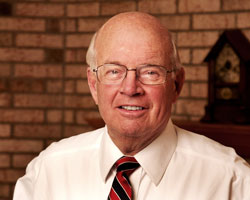McElhaney: What It Really Means to Talk Like a Lawyer

Photo of Jim McElhaney by Rick Allred
Jim McElhaney’s 25-year run as Litigation columnist for the ABA Journal will come to a close this fall. During those years, McElhaney’s straightforward advice on trial practice became one of the most popular features in the magazine. To commemorate McElhaney’s contributions, the Journal is reprinting some of his “greatest hits” from the past quarter-century. This article originally appeared in the Journal’s September 1991 issue under the headline “Professionally Speaking.”
It was humiliating. The young lawyer had put in more than a hundred hours on the brief. He had a novel interpretation of the appliance safety act that he was urging his firm to adopt in an important case. One of his memos had caught the attention of their client’s chief counsel, who suggested a strategy conference to discuss the young lawyer’s position.
The young lawyer knew he would have to talk about some of his ideas, but he wasn’t ready for what happened. “All right,” said the general counsel. “Let’s say that Mr. Baker and I are the court of appeals. We want to hear your argument. How are you going to convince us that for 60 years our reasoning has been wrong?”
The young lawyer was caught off guard. He floundered around for almost half an hour, hopping from one point to another, never really making a coherent statement. He was frankly relieved when the general counsel shifted his attention back to Mr. Baker and left him out of the discussion for a while. But by the end of the meeting, he could see that they had decided not to risk using his argument.
The ride back to the firm’s office was the worst part of it. Mr. Baker wanted to talk about the dynamics of what had happened.
“Maxwell caught you by surprise, didn’t he?” Baker said. “I should have told you that’s what he does. I still like your idea, but we may have to wait for a client who is more willing to take a chance.”
The young lawyer didn’t say anything.
“But you still got a lot out of that meeting, didn’t you?” said Baker.
“What do you mean?” said the young lawyer.
“You learned something a lot of lawyers never understand,” said Baker. “A lawyer is a professional speaker. You talk for a living. Every time you say something as a lawyer, you are making a professional presentation.
“It doesn’t matter whether you’re in trial, arguing to an appellate court, talking to a client or giving a CLE lecture. There are some basic rules for any kind of speech that you should follow if you’re going to be an effective advocate.”
That young lawyer was Angus. And now, 25 years later, he was making those same points to Beth Golden. I was there when Angus talked to Beth, and here are my notes.
Click here to read the rest of “More Than Just Words” from the January issue of the ABA Journal.



